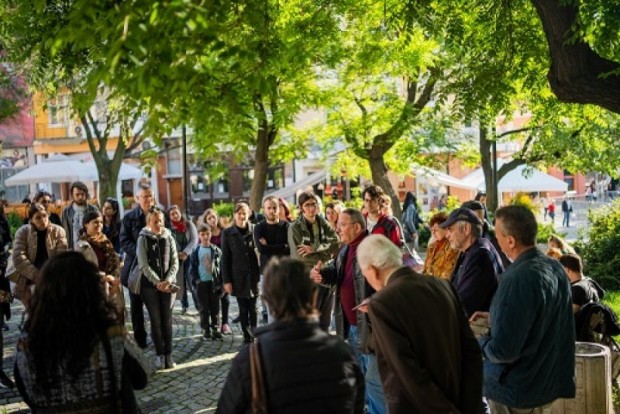Sirach (Ecclesiasticus) 7:33:
Be generous to every living soul, and be gracious to the memory of the dead.
[Good News Bible Catholic Edition (GNBDK)]
Usually people live in societies. The relationship between them is permanent and must be settled anyway.
The regulating principle in Christianity is self-love (Gal. 5:14). Manifestations in love, depending on the diverse human activity (vital activity), are diverse. Love is manifested among everything else, and in charitable activity, when a person does good, provides help, spiritual or material support to the needy. Charity is a necessity. Its importance and significance do not need special proof. Through charity, a person enables his neighbor who is in a narrow position to satisfy his various mental and physical needs, to fulfill his purpose here on earth and to prepare with dignity for the future life. When, on the contrary, in the absence of timely help, the one in need deviates from his path, he cannot satisfy his needs, and often he is completely destroyed spiritually and physically. If this is so, it is indisputable that we are obliged to help our needy neighbors in the fulfillment of their Christian duty.
We have prescriptions for phylloxenia, philanthropy and philadelphia, ie. to patriotism, philanthropy and brotherly love, we have the germ of this vital love, which in the New Testament has developed in its fullness. The merciful love of the Old Testament was limited on two sides – it has a national and sub-legal character, it also lacked this universality and freedom that true love has. In later Judaism, especially after the Babylonian captivity, these embryos not only did not develop, but were also suffocated and developed unilaterally. By a neighbor began to understand exclusively every foreigner, all non-Jews began to consider an enemy. Even contempt for non-Jews was considered piety and a sign of special zeal for God and His Law. While the loving mood seeks to alleviate the social need in general, the legal prescription applies only to individual cases and is satisfied with their performance. The Pharisees give alms, but without love – for them it is only an external bylaw. They do not mean the good of their neighbor, but only their own glory and piety.
Preachers began to emphasize not only the love of Jesus Christ as a stimulus to charity, but also the various fruits that accompany it. St. John Chrysostom says, “Whatever your sins are, if you give alms, it will outweigh the scales of the Judge.” The strong speeches of the holy fathers of the church at that time in favor of Christian charity were dictated by the fact that many of the newly converted Christians continued to treat their fellow men with the same hatred with which the pagan world had previously treated them. “Every time we refuse to give alms, we will be condemned as robbers,” says St. John Chrysostom. And St. Basil the Great reasoned as follows: “The excess bread, kept by you, belongs to the hungry, the clothes of the naked, and the buried silver to the poor.” As prominent benefactors and benefactors in this era are remembered: Pamahi, Peacock, Macrina, Olympias, Nonna, Marcela, Fury, Paul, Fabiola and others. Along with the purely domestic and parish charity, the establishment of purpose-built establishments began, in which the poor, the sick and the weak received help, medical care and care. Usually these establishments were erected by the bishops, because they had the duty and responsibility to use the church property, as well as the duty of archpastors to take care of the needy. There were private or public charities built by emperors or wealthy Christians. Some of these facilities had a general purpose and were called inns, while others had a private purpose, such as orphanages, hospitals, nursing homes, or nursing homes. St. Basil the Great built the most remarkable hospital in Caesarea Cappadocia at that time. Following her example, John Chrysostom built a hospital in Constantinople.
For the management of the charitable activity and the specialized charitable institutes of the bishop were given assistants – butler and choir bishop. The first supervised the work of the deacons, and the second cared for the poor in the villages. More and more, the monasteries were engaged in acts of charity and organized charity, where over time huge funds were accumulated. They showed hospitality to the needy and the poor, to the sick – whether from spiritual or physical disabilities, they generously helped the victims of wars, barbarian invasions, natural disasters and political disasters. the great moral principle that underlies every good deed:
„37 A gift hath grace in the sight of all the living, and restrain not grace from the dead.” instructs the wise Jesus, the son of Sirach (Sirach 7:37). If we, Orthodox Christians with heart and soul, with living faith in Christ God, pray and give alms to the living and for the repose of the dead, we ourselves and in this world will enjoy the longed for peace of mind and peace, and more and more our prayers will be effective – they will lead us more and more to the eternal light in the Kingdom of God.
It is no coincidence that an ancient Christian custom and a meaningful church institution is indebted to the dead – an expression of the faith of Orthodox Christians in the immortality of the human soul – as charity and charity on their behalf for repose in the afterlife.









